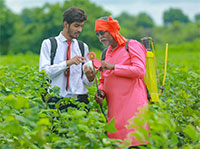Decisions taken at the 2015 Conference of the Parties to the Basel, Rotterdam, and Stockholm Conventions, May 4-15, 2015, Geneva-Switzerland
Stockholm Convention (COP 7):
DDT:
- India was granted an extension to produce DDT, to manufacture dicofol, until 15 May 2024.
- Use of DDT for disease vector control will be evaluated at the next COP (2017).
Listing of Pentachlorophenol (PCP) and its salts and esters: The proposal to add PCP, and its salts and esters, to Annex A of the Stockholm Convention was strongly opposed by India, so there was no consensus. For the first time in the convention’s history, parties at COP 7 used Article 21(3) to vote. By majority vote, COP 7 agreed to add PCP to Annex A, with specific exemptions production and use of PCP for utility poles and crossarms.
PFOS:
COP 7 decided to continue the acceptable purpose to produce PFOS for the production of sulfluramid, used in the manufacturing of ant baits.
Rotterdam Convention (COP 7):
Methamidophos: COP 7 decided to amend Annex III of the Rotterdam Convention to include methamidophos.
Paraquat dichloride: India, Guatemala, Indonesia and Paraguay opposed listing of paraquat dichloride 276 g/L (20% and above) as a Severely Hazardous Pesticide Formulation (SHPF). Consideration was moved to COP 8.
In 2010 Burkina Faso proposed listing the liquid formulation of paraquat dichloride 276 g/L (paraquat ion at or above 200 g/L) as a SHPF in Annex III to the Rotterdam Convention. The proposal to list paraquat dichloride was deliberated at COP 6 in 2013, however India and Guatemala opposed it and it was deferred to COP 7.
Fenthion: Fenthion ultra-low volume (ULV) formulations at or above 640 g active ingredient /L was proposed by Chad for listing as a SHPF to the Rotterdam Convention. Sudan opposed listing fenthion as a SHPF in Annex III. COP 7 decided to defer further consideration until COP 8.
Trichlorfon: India opposed listing trichlorfon in Annex III to the Rotterdam Convention. COP 7 decided that considerations for listing trichlorfon be deferred to COP 8.
Intersessional Working Group: COP 7 decided to establish an intersessional working group of interested parties and observers to review cases in which a chemical was not listed, and to develop proposals to improve the effectiveness of the Rotterdam Convention. Proposals from the intersessional working group will be reviewed during COP 8.
Next COPs: The Basel, Rotterdam and Stockholm COPs agreed to convene the next COPs, with a high-level segment, back-to-back in 2017.

 We are collecting individual signatories from around the world to call on the FAO to stop its #ToxicAlliance with CropLife. Sign on and get others to do the same!
We are collecting individual signatories from around the world to call on the FAO to stop its #ToxicAlliance with CropLife. Sign on and get others to do the same!